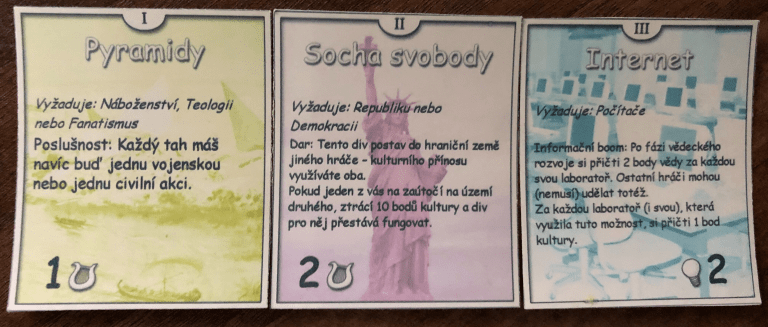Through the Designer's Notes, Part 2

In my last post, I was writing about how the leaders sneaked to Through the Ages from an older prototype of mine. You probably wonder also about the wonders. But before diving into it, I owe you one more explanation.
Who Leads the Nation
Even if you accept that kind of random approach to leader selection I described earlier, you may still wonder - why the heck I thought Aristotle, James Cook, or Sid Meier are leaders of a nation? Well, I haven't. In my Czech prototype, they were called "osobnosti", which means "personalities" or "great persons". Their texts were not meant as effects of their leadership, it was rather the influence and legacy of those persons that affected the entire nation for centuries. The nation had only one leader, kind of timeless and transcendent - you.
When Jason, our translator, translated them as "leaders", I was not happy with that. He argued that calling them "leaders" is much simpler and easier to grasp than "great persons", and people get used to it. I was not sure, but I reluctantly agreed. As a memento, we still call them "osobnosti" in all Czech versions of the game.
When writing rules for the new version, I stumbled upon it, again. I tried to make it clear how it was meant (in the section about Leaders, there is written: "A leader is a great historical figure whom you choose to be the spiritual guide of your civilization. The leader's legacy gives you special abilities and benefits.")
But well, artificial reasoning does not work much. They are called leaders, so they are considered leaders. We are even displaying the current leader as the player avatar in the digital version of the game (and you usually remember your opponents by them), and when playing the game, players seem to accept the fact a nation can be led by Shakespeare. At least I sure got used to that - Jason was correct
And Those Wonders
As you might guess, that old game had wonders, too, as while having great persons is optional in a civilization-themed game, wonders are simply a must . Although many wonders were shared between that game and Through the Ages, the changes of the selection were much bigger in this case. I might say it was because they worked very differently - they were only of three ages, they were dependent on certain techs, they were picked and constructed by different ways, they belonged to a certain territory, etc. - but well, the fact I had just a googled background image and not a hand-drawn a picture for each one of the original wonders sure made the decision to change them easier
Some remained for obvious reasons - how can you make a list of wonders without Pyramids or the Great Wall. But there were also some less typical that were amongst the original selection.
One of those I was proud of back then was Internet. You might say - why, Internet is a typical wonder included in most of Civilization games. But at the time when I was creating that game, Civilization III, where Internet first appeared, was not published yet. And I said to myself - hey, is there anything that changed humankind more in the last century than this instant access to information and the affordable way how to produce content for others? Sid Meier should include internet as a wonder into his games. I will sure do it
Well, today, when I see what Internet and social media do to people, I am not that thrilled, but still, Internet affects the world more than anything else. It does not have to be only positive. Which brings me to Fast Food Chains, another wonder that came from the first game. That odd "wonder" might cause some people to question my values . But no, I am not a regular Mc-Taco-King-Whatever consumer. The idea was to show that the culture points mean how much you affect the world, and it does not have to be objectively positive. You can spread your culture by great artists, by your swords - or by hamburgers. So, I included Fast Foods also into Through the Ages, as a symbol of globalization, which sure affects the world a lot.
By the way, Age III wonders were more interesting in that old game, they had some strong and cool ongoing effects. But that just didn't work well. You cannot balance effects if you do not know whether they will be in the game five rounds, or just one. Changing them just to "giving a crazy amount of culture when finished" was a good solution, I lost some of the thematic variability, but now, finishing an Age III wonder is the true climax of the game while considering "whether the wonder still pays off or not" wasn't. In the expansion, I toyed with it a bit more, all the wonders are more interactive, but I was still keeping in mind their main effect should be lots of culture (in case of Manhattan Project, it may be culture gained by a war
Ah, I just went through those old cards and found something I already forgot. Statue of Liberty was a wonder in that old game, too (in Through the Ages, it was added in the expansion). However, its original effect was different - you had to build it on a territory of another player, you both produced some culture, but you both suffered huge culture penalty if attacking each other. Sounds familiar? Yeah, this wonder was the first pact in the game.

